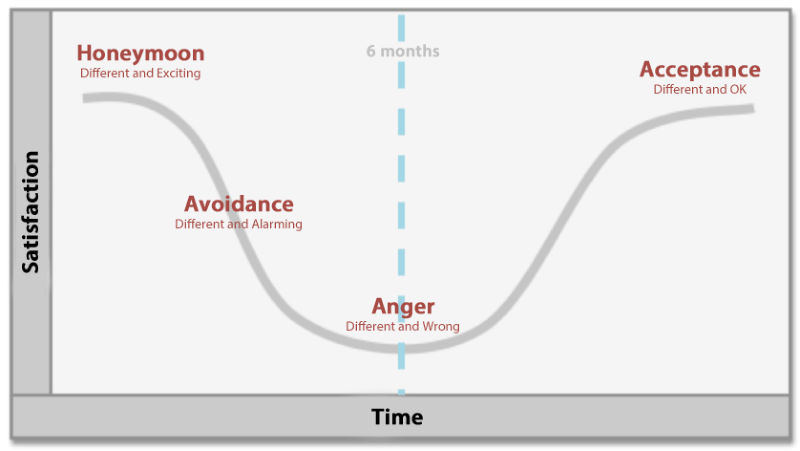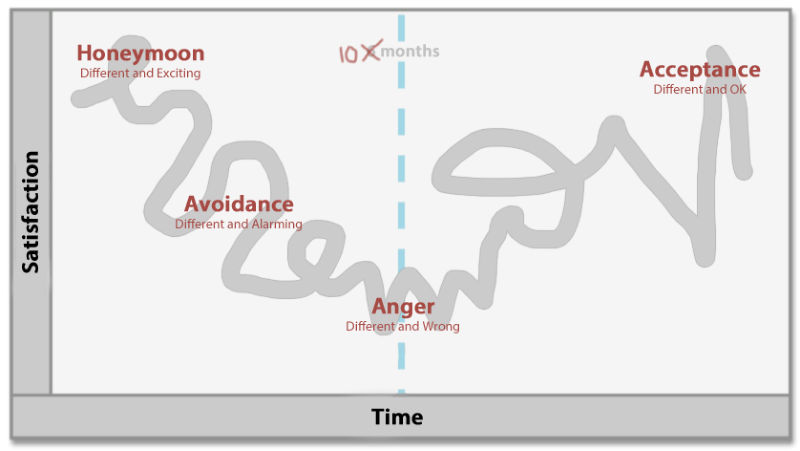We soak up everything that Lonely Planet, Rosetta Stone and Wikipedia have to offer about our soon to be new home.
In our zeal, we are prone to misgauging our own proficiency.
We are pumped . . . and ready . . . and oh so naive.
Set for swindling.
A big thank you to Jerry of thecultureblend.com. This post is a reproduction of his article, "The Seven Lies of Living Cross Culturally". He expresses the expat situation so well, I wanted to share it with my readers.
There are seven great deceptions and most of us fall for at least five. I have personally tested them all. You know . . . for research.
I lay them out now NOT for the sake of those who are packing up their lives and getting ready to go. That would be like telling newlyweds that marriage is hard.
They just tilt their head and grin at you as if you’re the cute one . . . “yeah, we know it’s hard for everyone else but we’re sooooo in love . . . and it will never, ever be hard for us.” You’re sweet and I would never steal this time from you. Proceed.
But for those of you coming down from the honeymoon (and possibly even some of you veterans) . . . here are seven deceptions which you may or may not have noticed just yet.
It’s perfectly natural when we relocate from one country to another country to focus entirely on those two cultures. Give me a spreadsheet with TWO columns and tell me how our cultures are different.
WE like personal space — THEY don’t.
WE are direct — THEY are indirect.
WE use a fork — THEY use their fingers
BOOM! I got this.
There are tests and inventories and boatloads of brilliant research that can help you size up YOURS and THEIRS. Culture to culture, side by side.
I love that stuff. I could get lost in it but the big reality shocker comes when you realize that living cross-culturally is not simply TWO cultures but it requires MULTIPLE layers of cultural adjustment.
Here’s the kicker — often times the OTHER cultures are more consuming than the one of your host country.
This list goes on.
It’s never just two
Learning a new language is hard. Sure it’s easier for some people than others and no doubt there are gifted learners who seem to have flair for picking it up quickly. The rest of us are . . . what’s the English word?
NORMAL
Regardless, one of the most painful realizations is that a new language doesn’t just grow organically in your brain because you are surrounded by it.
Expats are survivalists first and foremost. We pick up the absolutely essential phrases, we seek out picture menus, we print taxi cards, we download apps and we are shameless masters of hand gestures and charades.
Never has there been a group of people who have worked harder to communicate without learning how to.
In many places, you can be (and you will not be alone) an expat for years upon years and never learn the language. Intentionally choosing the harder option is key.
It doesn’t just happen.
“Culture shock” is a deceptive phrase. The word “shock” insinuates some kind of unforeseen, instant jolt. As if you stuck your fork into an outlet and BAZZZAAAPPP!
“WHOA! Should have used chopsticks! Didn’t see that coming.”
Consequently, when we don’t have the quick sizzle, hair raising, eye-bulging zap followed by the easily distinguishable and obviously dysfunctional meltdown we assume (incorrectly) that we have beat the system. No culture shock for me.
“I am Transition Man! Your culture bolts are no match for my defences!”
But the transition from one system to another system is not a switch that we flip, it is a process that we go through. That process includes the stress of adjusting from the way you have always done it to the way it is now done.
It includes wrestling with knowing, without a doubt that your way is better . . . and then thinking that it probably is . . . and then wondering if it might be . . . and then acknowledging there may be two good ways . . . and then (sometimes) recognizing the new way is better.
For some people, the process is harder, deeper, darker, more dysfunctional. Some people thrive on the instability.
It’s not the same (by any means) for everyone but no one gets immunity.
Maybe you’ve seen something like this:

Tools like this are especially helpful when cultural transition feels like puberty. “Why am I feeling like this?! Why am I acting like this?! GET OUT OF MY ROOM!!”
In the complicated, confusing moments of adjustment, charts like this serve as a sweet reminder of a simple yet solid truth.
“I’m normal??. Waaahh, that’s fabulous. But seriously, get out of my room.”
The problem with the standard culture shock continuum is NOT that it is inaccurate. It is that we think it was designed to be more accurate than it is.
“I feel like my transition had more dips than that.”
“I think my dip wasn’t so deep but it lasted longer than 6 months.”
“I don’t think I ever got a honeymoon phase.”
Yes. Yes. Yes. You are spot on. Your transition is yours. It is dramatically different than the next guys and his is different than everyone else. If you are expecting to fit exactly into the right schedule for adjustment you’re likely to slip back into feeling weird or abnormal or dysfunctional or superhuman.
There are too many variables for everyone to have the same transition.
This was mine.

In human years, expats move from 5 to 16 in about two months. Let me explain.
Expats are uber inquisitive on the front end. “What is that? How do you say this? What’s that smell? Why do they do that? What’s the history behind this? Who? What? When? Where? How? Why? Why? Why?”
Like a 5 year old. We embrace ignorance on a quest for answers.
BUT (and this is where it ALL falls apart): We think when we get an answer, we understand it (you should read that sentence again). Soon we “know” (finger quotes) everything.
Like a 16 year old.
When we have answers, we stop asking questions. This can be a fatal flaw for expats. There is ALWAYS more to it.
“Ignorance is not your problem unless you think that you’re not ignorant.”
-Albert Einstein – should have said this
Embrace ignorance and stay 5 for a while.
For contrast, imagine describing the climate of North America as frigid because you spent Christmas day in Northern Canada. Check out Guatemala in July before you share your expertise.
There is always more to it.
This one is doubly deceptive. It sneaks up on you and you never see it coming. There are no instant, clear cut signs, but one day . . . months from now . . . maybe even years, you realize you’ve been duped.
No one is more excited than the honeymooning newbies to engage local culture.
“We’re going to make lots of local friends and study language, learn their customs, and teach them ours. We’ll share cooking lessons and laugh about idioms. It’ll be great!”
Then . . . over time . . . and one interaction at a time, you take the least challenging option.
It’s frustrating to speak a language you don’t know. You don’t connect with these people on sports or politics or food or fun and it feels more like work than friendship.
That’s how the bubble is built.
For clarity let me just say . . . I love the bubble. Some of my best friends are in that bubble and I like hanging out there.
BUT I don’t want to be STUCK inside of it. To live cross culturally and never genuinely experience (deeply) your host culture is a BIG miss. To be surrounded by people who are SO different and could teach you SO much and never find a friend, is a sad thing.
The lie we believe is that it won’t happen to us. However, without tremendous and ongoing intentionality it almost always does.
This varies dramatically depending on who you are and where you are living. It is painfully easy to mistake cultural hospitality for respect and admiration. “These people treat me like a rock star.”
It’s easy to let that misguided reaction go to your head (much like a rock star would). The result is typically tragic.
This is where cultures get abused and foreigners leave a trail of mess behind them. In their arrogance, they assume that they have all of the pieces — “They smile when they see me, they laugh at my jokes, they want to spend time with me . . . they must love me.”
There is always more to it.
Or maybe they love you.
Point is, you can’t know until you stick around and build a real relationship. That’s where the good stuff is. The real stuff.
If you’ve been duped, welcome to the club. Actually you’ve been here for a while, but none of us wanted to say anything. Welcome back from your honeymoon.
This is where it gets good.